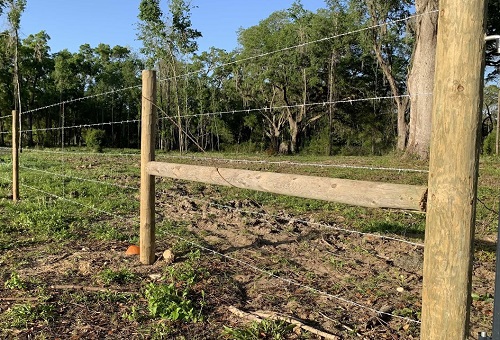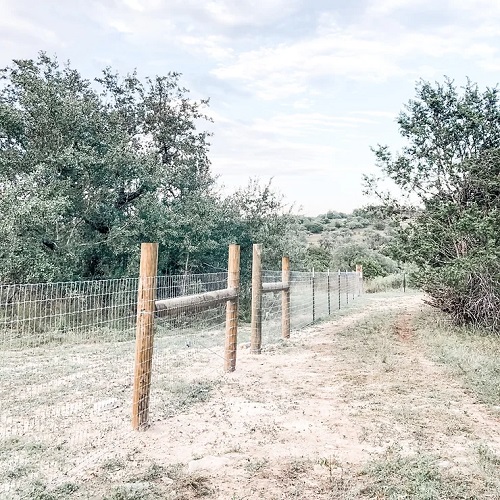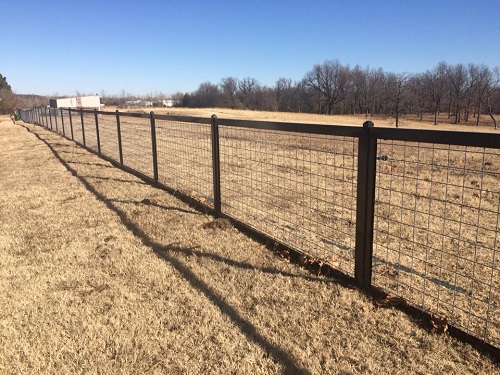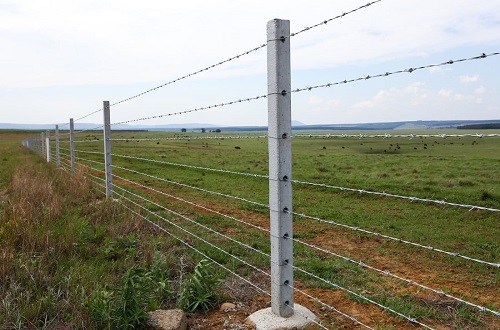Ready to give your farm a facelift? Check out these trendy Farm Fence Ideas and make your property stand out!
Fences are so much more than mere boundary markers. They protect, define, and even enhance the looks of a farm. From the classic wooden to the wire designs, this article has a collection of the best Farm Fence Ideas.
Farm Fence Ideas
1. Barbed Wire Fencing
Barbed wire fencing is a classic and cost-effective option known for its durability and resistance to outdoor elements. Its sharp barbs deter trespassers and help manage livestock, keeping them contained and safe. Learn the how-to in this helpful video tutorial.
2. Steel Pipe Farm Fencing
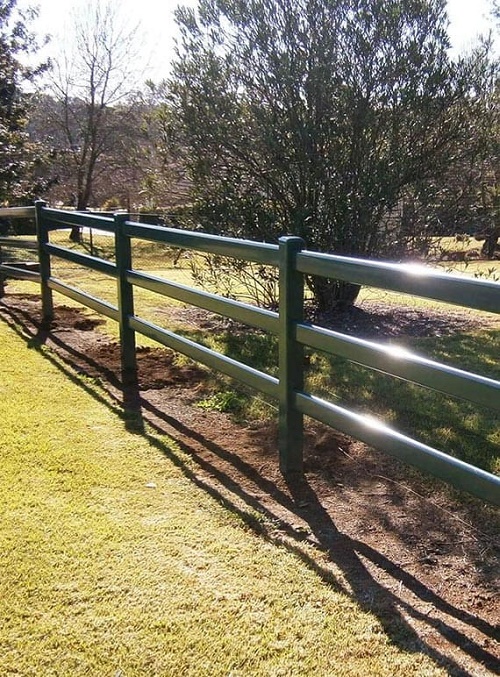
Visually stunning and easy to maintain, steel pipe fencing can easily withstand harsh weather conditions. This robust and durable fencing solution is an excellent choice for livestock containment.
3. Woven Netwire Farm Fence DIY
Learn how to build a cheap woven netwire and wooden post fence for a hobby farm in this step-by-step tutorial. This low-cost project is perfect for those looking for a balance between functionality and a straightforward DIY experience.
4. Hog Wire Fencing Idea
Made from sturdy hog wire panels and wooden frames, this fencing is a reliable choice for livestock safety. The hog wire fencing combines durability and functionality with a rustic charm.
5. 3 Rail PVC Vinyl Farm Fence
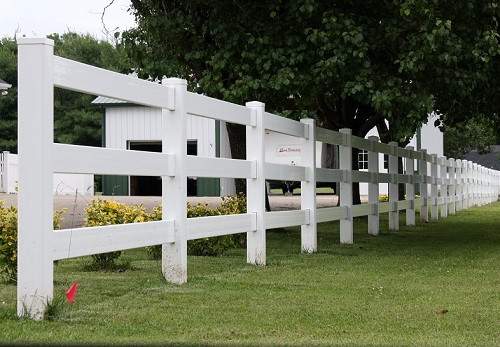
Crafted from robust, weather-resistant PVC vinyl, this farm garden fencing promises longevity and minimal maintenance. Its classic three-rail design ensures security and a clear visual of the landscapes beyond.
6. Modern Heavy Duty Vinyl Crossbuck Horse Fence
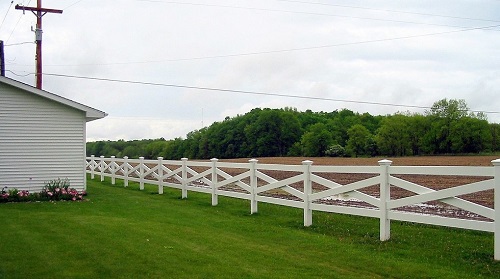
The heavy-duty vinyl crossbuck fence is a stress-free solution for your fencing needs. It doesn’t need painting, sanding, or staining. This fence not only enhances the aesthetic appeal of your property but also stands resilient against time and elements.
7. Ponderosa Wood Post and Galvanized Tubes Fencing
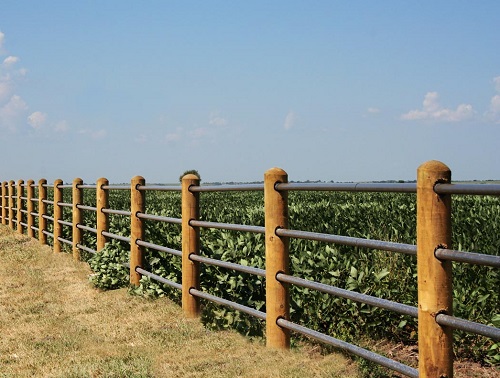
Featuring wooden posts and galvanized tubings, this farm fencing is suitable for both country-style landscapes and contemporary farm environments. The wood posts are pressure-treated, whereas the galvanized tubes are powder coated.
8. Barbed Wire and Concrete Posts Fence
Constructed from robust concrete posts and barbed wires, this farm fencing is perfect for keeping livestock contained and deterring unwanted visitors. It’s excellent for those who prioritize functionality and practicality over aesthetics.
9. High Tensile Wire Fencing
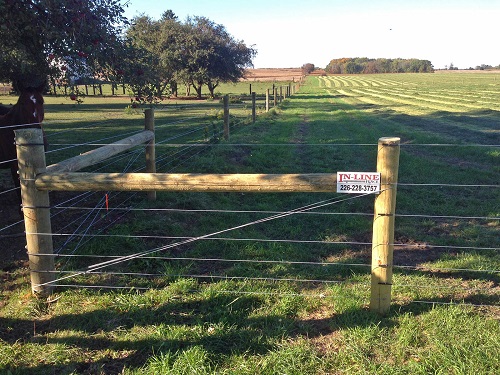
High tensile wire fencing is long-lasting and easy to maintain. This modifiable fencing system ensures your livestock stays on the farm and the wild animals in their natural habitat. Its minimalistic design blends seamlessly with any landscape.
10. DIY Simple Wood Farm Fencing
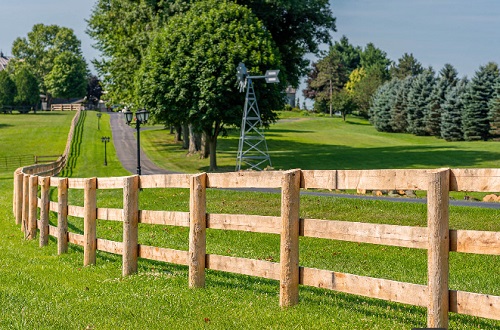
Wood board fences are the perfect choice to enclose large farm animals and establish property lines. These fences give your farmland an eye-popping aesthetic upgrade and will keep your property safe and secure for years to come. It’s one of the best farm style fence ideas.
Important Points to Remember
When planning for a farm fence, here are a few points to keep in mind:
- Purpose: Before you begin, clearly define the purpose of your fence. Are you trying to keep animals in or out? Is it for privacy, aesthetics, or both? The purpose will dictate the materials, design, and structure of the fence.
- Type of Animals: If you’re keeping animals, the type of animals you have will determine the type of fence you need. For example, horses require a tall, sturdy fence, while chickens can be contained with a simple wire mesh fence.
- Local Laws and Regulations: Always check your local laws and regulation regarding fences. Some areas have specific rules about fence height, design, or materials. You may need to obtain a permit before beginning the building process.
- Cost and Maintenance: Evaluate your budget and how much time and money you’re willing to spend on maintenance. Some materials, like vinyl and aluminum, require less maintenance than wood.
- Location and Layout: Consider your land’s topography and the best place to put your fence. This affects the type of fence you choose, its design, and how it will be installed.
- Installation: Evaluate whether you’re capable of installing the fence yourself or if you’ll need professional help. This could significantly impact your budget.
- Access Points: Plan for gates and other access points. They should be wide enough to accommodate machinery, livestock, and vehicles as needed.
- Longevity and Durability: Choose materials and designs that are known to last and withstand the elements. For example, treated wood or high-quality metals are good choices.
- Safety: Design your fence in a way that is safe for both animals and humans. Sharp edges or points should be avoided.

